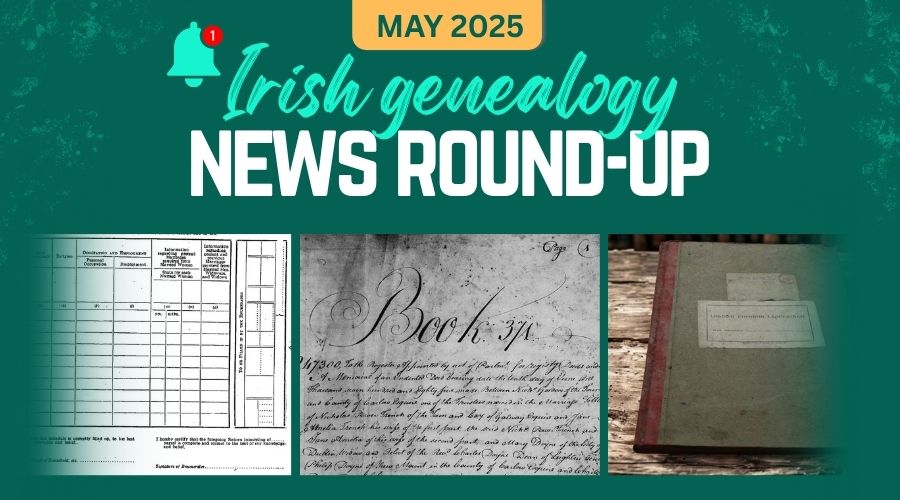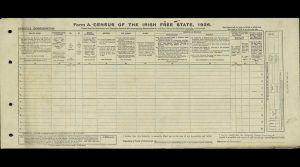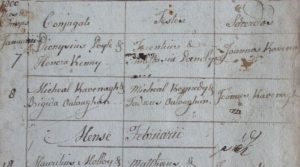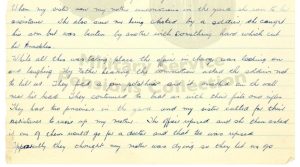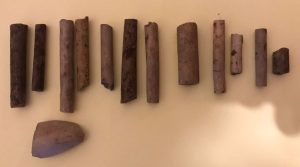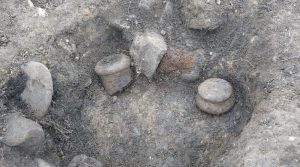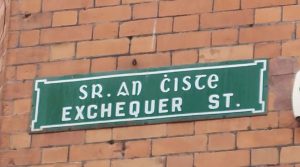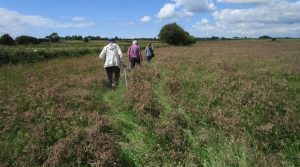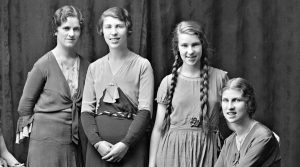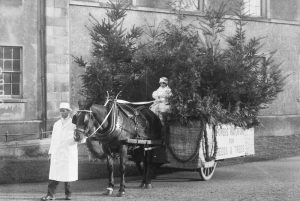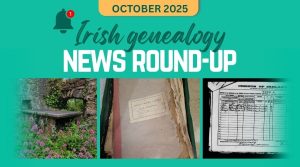In our Irish genealogy news round-ups, we share the latest developments and discoveries in Irish family history research, from newly digitized records and online tools to local projects and events. Highlights in this report include updates on the 1926 census digitization project, newly digitized and indexed church records, headstone transcriptions and Registry of Deeds records, as well as upcoming workshops, courses, gatherings and much more.
For a quick overview of some of the main news stories, watch our video below (just press play) or scroll down for the full round-up and in-depth updates.
1926 Census
The 1926 Census of Ireland made headlines last week when Minister for Arts, Culture and Communications Patrick O’Donovan briefed the cabinet on the progress of the digitization project. The census is due to be released online on 18 April 2026. The project is being led by the National Archives of Ireland in cooperation with the Central Statistics Office (CSO) and is supported by €5 million in government funding.
The release will mark a major milestone for Irish genealogy. The 1926 census was the first conducted by the Irish Free State and recorded 2,971,992 people living in the 26 counties, with 49% female and 51% male. It includes detailed information on each individual, including name, age, birthplace, religion, occupation, employer details, marital status and marital history, whether they spoke Irish and details about the house where they were residing or staying on the night the census was taken.
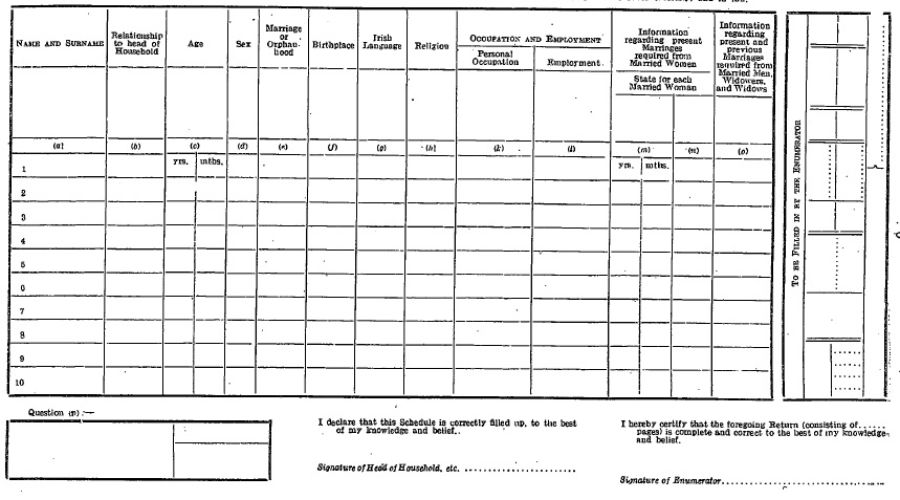
The first complete census of the population of Ireland was conducted in 1821 and was then repeated every 10 years until 1911. No census was taken in 1921 due to the War of Independence, making the 1926 returns the first population records in 15 years and the first for the new Saorstát Éireann.
>>> YOU MIGHT ALSO LIKE: Expert guide to Irish census records available for free download ahead of 1926 census release
The census returns from 1821 to 1891 have not survived in full. Most of the 1821, 1831, 1841 and 1851 records were destroyed in the Public Record Office fire of 1922 – only fragments of these censuses have survived. The 1861, 1871, 1881 and 1891 returns were deliberately destroyed before the fire. The 1901 and 1911 censuses survive in full and are already available online, along with the surviving pre-1901 fragments. All of these can be searched for free on the National Archives website here. The 1926 census will also be freely accessible there next year from 18 April.
A D V E R T I S E M E N T
Earlier this year, the National Archives introduced a new system for searching the 1901 and 1911 census records and pre-1901 fragments, which is still being refined. For those experiencing problems with the updated interface, our guide to navigating the new system is available here.
>>> RELATED: Navigating the new system for Irish census records launched by the National Archives
Meanwhile, other developments have also been recently announced in the Irish genealogy sector.
Ireland Genealogy Projects – latest additions
New headstone transcriptions from five graveyards and church records from one parish have recently been added to the free Ireland Genealogy Projects (IGP) archive, which is run entirely by volunteers.
Headstone records:
- Carlow: St Patrick’s Roman Catholic graveyard, Newtown
- Cavan: St Dympna’s Roman Catholic graveyard, Lavey
- Kerry: John Paul II burial ground, Listowel
- Wexford: St Mary’s cemetery, Enniscorthy
- Wexford: Tomhaggard Old Roman Catholic graveyard
>
Church records:
Sign up to our newsletter
Deeds
At the Registry of Deeds Index Project, the volunteer-led initiative has indexed 627,831 records from 64,525 memorials of deeds as of 15 May. The database is free to search here.
Earlier this year, FamilySearch launched a new search tool for the Registry of Deeds records, using computer-generated transcriptions and AI summaries to assist researchers in navigating these complex but often rewarding records. You can search the Registry of Deeds records on FamilySearch here.
>>> RELATED: FamilySearch updates its Irish collections with more free searchable church records, deeds and dog licences
When you make progress with the deeds records on FamilySearch, remember to return to the Registry of Deeds Index Project and share the details of your own findings.
Please help support
Irish Heritage News
A small independent start-up in West Cork
Give as little as €2
Thank You
FamilySearch Irish collections – latest additions
FamilySearch has expanded its Irish collections, indexing 395,301 new Catholic parish register records and 2,936,869 19th-century records from the Valuation Office Books. Remember, the site provides free access to all its records, but you must create a free account and be logged in to view and search them. You can search the church records on FamilySearch here and the Valuation Office records here. The Valuation Office records are also available to search on the National Archives website here.
Wicklow school records
Our recently compiled guide to Co. Wicklow’s school records provides practical advice on how to access these valuable sources for family history research. Read the full guide here.
>>> RELATED: A guide to Co. Wicklow’s historical school registers, roll books and other school records
Killorglin baptism records
RootsIreland added 20,385 Roman Catholic baptism records from Killorglin parish, Co. Kerry, to its database earlier this month. The new records cover the period from 1798 to 1911, with some gaps between 1851 and 1880. You can view an up-to-date list of their Kerry records and search them here. Remember, RootsIreland is a subscription site – but you can also search Killorglin church records for free at IrishGenealogy.ie.
A D V E R T I S E M E N T
Belfast News Letter archive goes online
A newly expanded digital archive of the News Letter — the world’s oldest continuously published English-language daily newspaper, founded in Belfast in 1737 — is now available online for the first time. The British Library, FindMyPast and the Northern Ireland Office collaborated to digitize 18th- to 20th-century issues, which can now be accessed via the British Newspaper Archive and FindMyPast. These are subscription-based platforms, but we’re currently running a special offer for FindMyPast — scroll down for details. Remember, a FindMyPast subscription also gives you full access to the British Newspaper Archive.
A F F I L I A T E A D 
Ulster Historical Foundation’s research programmes
Looking ahead, registration remains open for the Ulster Historical Foundation’s 2025 online research programmes. Sessions will take place in June, September and October, and offer guided assistance to those tracing their Irish or Scots-Irish ancestry. Numbers are limited and early booking is advised, with deposits currently being accepted at £100, reduced from the usual £200. Find out more here.
Genealogy and DNA workshops and drop-in sessions
Mayo:
The Mayo Genealogy Group will hold a free informal drop-in session on Saturday morning, 14 June, at the National Museum of Ireland – Country Life in Turlough Park, Castlebar, offering advice to anyone researching their Irish family history. New and experienced researchers are welcome – no booking required. More information here.
Donegal:
On Friday afternoon, 27 June, Monreagh Heritage Centre will host a free event offering one-to-one consultations with expert local genealogists to help you uncover the stories of your Ulster ancestors. Secure your place here.
A D V E R T I S E M E N T
Dublin:
Fingal County Libraries will host a free Irish genealogy workshop at Blanchardstown Library on Wednesday evening, 18 June. It will provide guidance on using free resources and practical tips for tracing Irish ancestry. Booking is recommended – secure your place here.
Professional genealogist Claire Bradley will lead a DNA workshop at Fingal Local Studies & Archives in Swords on Tuesday afternoon, 24 June and again on Tuesday afternoon, 8 July. The sessions are designed to help participants interpret their DNA results for family history research. Attendees must have access to their test results on the day. Spaces are limited and booking is essential. To book, email archives@fingal.ie or call (01) 8704486.
For those who cannot attend Claire’s workshop, you can read her guide to DNA testing for Irish family history research here.
>>> RELATED: A genealogist’s guide to DNA testing for Irish family history research
Online:
The Irish Family History Society (IFHS) will host a beginner-friendly DNA talk online on Tuesday evening, 17 June. The session, presented by Martin McDowell of the North of Ireland Family History Society, will cover the basics of DNA testing, including what tests are available, what they can tell you and how to use DNA in your genealogy research. IFHS members can register by emailing info@ifhs.ie. Non-members must register through the IFHS shop here and pay a €5 fee.
More DNA news
Claire Bradley recently highlighted that MyHeritage has stopped accepting raw DNA uploads from other testing companies. This may have repercussions for some Irish genealogical researchers. This change may be in response to the surge in uploads following the 23andMe data breach, its subsequent bankruptcy and recent acquisition by Regeneron Pharmaceuticals, as well as ongoing concerns over the use of MyHeritage’s database for forensic investigative genetic genealogy. Users must now purchase a MyHeritage DNA kit to access its database. For a limited time, MyHeritage DNA kits are just €33 (down from €89), including a free 30-day complete subscription trial. See offers here.
AncestryDNA is currently offering up to £30 off their DNA kits, now available from £49 plus shipping until 14 June. See offers here.
A F F I L I A T E A D

O’Mahony Society gathering
The O’Mahony Society is celebrating its 70th anniversary with a gathering in Macroom, Co. Cork, from Friday, 13 June to Sunday, 15 June. The event is open to society members and the wider public, with virtual participation available for some sessions. Full details here.
Kilkea Castle genealogy experience
Kilkea Castle has launched a new genealogy experience. In collaboration with professional genealogist Paul Gorry, it allows guests the opportunity to explore their Irish heritage and uncover historical family connections within one of Ireland’s oldest inhabited castles. Find out more here.
Sign up to our newsletter
Book of Leinster goes on display
If you’re interested in medieval genealogy, the 12th-century Book of Leinster — which includes genealogical lists, many concerning early medieval Leinster dynasties and important religious, with some lineages fabricated — has undergone meticulous conservation over the past two years and is now the focus of a new exhibition at Trinity College Dublin. Find out more here.
Ancestry’s transcription tool
This isn’t strictly Irish genealogy news, but it will be welcomed by many researching their Irish heritage: Ancestry has introduced a new transcription tool that uses AI to convert images of handwritten documents into machine-readable text. Currently in beta, the feature allows users to upload family letters, memoirs and other handwritten historical documents for automated transcription. Remember, Ancestry is a subscription site.
FindMyPast offers – 10% discount and free trial
As part of our official affiliate partnership with FindMyPast, you can enjoy an exclusive 10% discount on all their monthly, quarterly and annual subscription plans. FindMyPast offers access to billions of Irish and British genealogy records, along with over 2,000 Irish and British newspaper titles dating back to the 1700s. For full details and to access the discount code, click here. If you’ve never used FindMyPast before, you can also try it for free for seven days here.
A F F I L I A T E A D

Memorials and information panels unveiled
A new memorial in Dunmanway, Co. Cork, honours 14 orphan girls sent to Australia during the Famine under the Earl Grey scheme. Last week’s unveiling marked the 175th anniversary of their departure and was attended by Heather Northwood, a great-great-granddaughter of Ellen Desmond – one of the girls relocated from Dunmanway’s workhouse in late 1849. She was among an estimated 4,000 Irish girls, mostly orphans aged between 14 and 18, resettled between 1848 and 1850, partly to address the gender imbalance in Australia, which for decades had been a penal colony mainly consisting of men. A full account of the event can be found in the Irish Examiner.
Earlier this month, an information panel highlighting the story of the deserted pre-Famine village of Meenies was unveiled near Drimoleague, Co. Cork. The village comprised a cluster of houses with vegetable gardens, surrounded by an infield where oats or potatoes were grown, all set within commonage. The residents farmed communally under a system called rundale. Researched by Skibbereen Heritage Centre, the panel presents a tragic story of mass deaths and eviction in this small farming settlement. More information is available on the Skibbereen Heritage Centre website.
Advertising Disclaimer: This article contains affiliate links. Irish Heritage News is an affiliate of FindMyPast and the British Newspaper Archive. We may earn commissions from qualifying purchases.
READ NOW
➤ Understanding marriage settlements for Irish family history research
➤ New research reveals Lindsay Lohan could have ancestral links to Roscommon
➤ Irish genealogy news round-up, June 2025
➤ Almost 100,000 searchable Cork burial records now available online for free
➤ Tracing your roots online using old records of Irish gravestone memorials and “Mems Dead”

